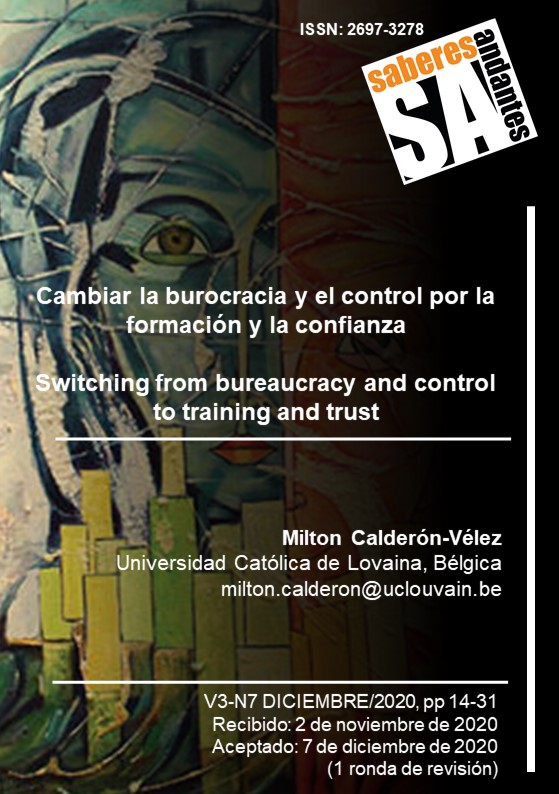Switching from bureaucracy and control to training and trust
DOI:
https://doi.org/10.53387/sa.v3i7.64Keywords:
standardization, control, trust, training, covid-19Abstract
The following essay explores the tension, visible in the Ecuadorian educational system, between a type of management based on bureaucracy and control and another based on training and trust, the latter increasingly in demand by educators. The essay seeks to understand the prevailing logics of work in the framework of the COVID-19 pandemic, since it has made visible a series of persistent educational problems over the years but that appear more strongly in times of uncertainty . The first part explains the context from which the educational responses are read in times of pandemic, and the second presents, briefly, the two management systems that account for the tension between the standardized views, promoted by the State, and the demands of trust from educators. In the end, some alternatives are listed to make this second type of management more and more present, and to move towards an education that frees itself from the logics that have imprisoned it over the years.
Downloads
References
Banco Mundial. (2020, junio 8). La COVID-19 (coronavirus) hunde a la economía mundial en la peor recesión desde la Segunda Guerra Mundial. Comunicado de prensa. https://www.bancomundial.org/es/news/press-release/2020/06/08/covid-19-to-plunge-global-economy-into-worst-recession-since-world-war-ii
Ceulemans, C. (2017). How to move beyond the trust - control dilemma? What insight into the work of educational standards might have to offer. Studia paedadogica, 22(2).
Dávalos, N. (2020a, agosto 29). Solo el 45.5% de hogares en ecuador tiene acceso a internet, según el INEC. PRIMICIAS Tecnología. https://www.primicias.ec/noticias/tecnologia/ecuador-hogares-acceso-internet-inec/
Dávalos, N. (2020b, septiembre 12). Ecuador tiene 11,18 millones de conexiones a internet fijo y móvil. PRIMICIAS Tecnología. https://www.primicias.ec/noticias/tecnologia/ecuador-millones-conexiones-internet-fijo-movil/
Ecuavisa. (2020, mayo 28). Corrupción: la otra pandemia que golpea a Ecuador | Ecuavisa. Noticias. https://www.ecuavisa.com/articulo/noticias/nacional/605851-corrupcion-otra-pandemia-que-golpea-ecuador
Fals Borda, O. (1993). La investigación participativa y la intervención social. Documentación Social. Revista de estudios Sociales y de sociología aplicada, 92, 9–21.
Foucault, M. (1981). Las Mallas del Poder. Paidós Ibérica.
Foucault, M. (2009). Vigilar y castigar. Nacimiento de la prisión. En Vigilar y castigar. Nacimiento de la prisión. Siglo XXI Editores.
Giroux, H. (1995). Teoría y resistencia en educación. Una pedagogía para la oposición. En Docencia (Vol. 15). Siglo XXI Editores.
Giroux, H. (1997). Los profesores como intelectuales transformativos. Docencia, 15, 60–66.
INFOBAE. (2020, marzo 25). Bolsonaro critica cuarentena por coronavirus y pide “vuelta a la normalidad” de Brasil - Infobae. AGENCIAS. https://www.infobae.com/america/agencias/2020/03/25/bolsonaro-critica-cuarentena-por-coronavirus-y-pide-vuelta-a-la-normalidad-de-brasil/
Mejía, M. (2001). Educaciones y pedagogías críticas desde el sur (Cartografías de la Educación Popular). CEAAL, Consejo de educación de adultos de América Latina.
Lineamientos e instructivo para registro y seguimiento de actividades de los funcionarios bajo la modalidad de teletrabajo, (2020).
Ortiz, M., & Borjas, B. (2008). La Investigación Acción Participativa: aporte de Fals Borda a la educación popular. Espacio abierto. Asociación Venezolana de Sociología, 17, 615–627.
RTVE. (2020, mayo 9). Coronavirus | Miles de personas protestan en Alemania contra las medidas restrictivas por el coronavirus. Coronavirus. https://www.rtve.es/noticias/20200509/miles-personas-protestan-alemania-contra-medidas-restrictivas-coronavirus/2013717.shtml
Schwab, K. (2016). The Fourth Industrial Revolution: what it means and how to respond. World Economic Forum, 01. https://www.weforum.org/agenda/2016/01/the-fourth-industrial-revolution-what-it-means-and-how-to-respond/
Tavernise, S., & Oppel, R. (2020, marzo 23). Les escupen, les gritan, los atacan: los chinoestadounidenses temen por su seguridad - The New York Times. Estados Unidos. https://www.nytimes.com/es/2020/03/23/espanol/mundo/coronavirus-racismo.html

Downloads
Published
How to Cite
Issue
Section
License
Copyright (c) 2020 Milton Leonel Calderón-Vélez

This work is licensed under a Creative Commons Attribution-NonCommercial-ShareAlike 4.0 International License.
1. Derechos de autor
Las obras que se publican en Saberes Andantes están sujetas a los siguientes términos:
1.1. Saberes Andantes, conserva los derechos patrimoniales (copyright) de las obras publicadas, favorece y permite la reutilización de las mismas bajo la licencia Licencia Creative Commons 4.0 de Reconocimiento-NoComercial-CompartirIgual 4.0, por lo cual se pueden copiar, usar, difundir, transmitir y exponer públicamente, siempre que:
1.1.a. Se cite la autoría y fuente original de su publicación (revista, editorial, URL).
1.1.b. No se usen para fines comerciales u onerosos.
1.1.c. Se mencione la existencia y especificaciones de esta licencia de uso.








